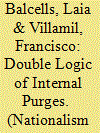| Srl | Item |
| 1 |
ID:
174593


|
|
|
|
|
| Summary/Abstract |
States often engage in internal purges to eliminate political dissidents within their own ranks. However, partly because of the absence of reliable data, we know little about the logic and dynamics of these purges, particularly of lower-rank members of the state. Why do state authorities persecute these individuals when they do not entail a clear threat to the regime? We focus on the purges of public-school teachers during the early years of Francisco Franco’s regime in Spain. Using detailed historical sources, we explore whether teachers were more likely to be purged following the two main cleavages in 1930s Spain: the left-right divide and the center-periphery (i.e., nationalist) cleavage. Our results suggest that while the Spanish Civil War (1936–1939) was still unfolding Francoist authorities targeted mainly teachers from leftist localities, thus focusing on potential security threats behind the frontlines. After winning the war, Francoists started to target more intensively teachers from national minority groups in order to promote nation-building policies leading to their assimilation. Our findings highlight the double logic of purging as both a preemptive measure against internal threats and as a nation-building tool.
|
|
|
|
|
|
|
|
|
|
|
|
|
|
|
|
| 2 |
ID:
178717


|
|
|
|
|
| Summary/Abstract |
Recent research has focused on the legacies of civil war violence on political preferences, finding that wartime victimization decreases support for the perpetrator or its political identity in the long run. However, we know little about the conditions under which this effect takes place. Historical accounts from civil wars suggest that the long-term effect of violence is not homogenous, nor consistent across areas within a single conflict. Addressing this gap, this article explores the effects of wartime victimization on long-term political preferences at the local level, looking at the conditioning effect of the local social context. In particular, I argue that the effect of wartime violence depends on the existence of local networks that create and maintain memories of the violence and capitalize on them for future mobilization. This argument is tested in the context of the Spanish Civil War. I build a novel dataset using archival data, historical secondary sources, and already existing datasets, covering 2,100 municipalities across Spain. In line with the argument, it is found that Francoist wartime victimization during the civil war is linked to an increase in leftist vote share after democracy was restored four decades later, but mainly in those municipalities where clandestine, left-leaning political networks were active after the conflict.
|
|
|
|
|
|
|
|
|
|
|
|
|
|
|
|